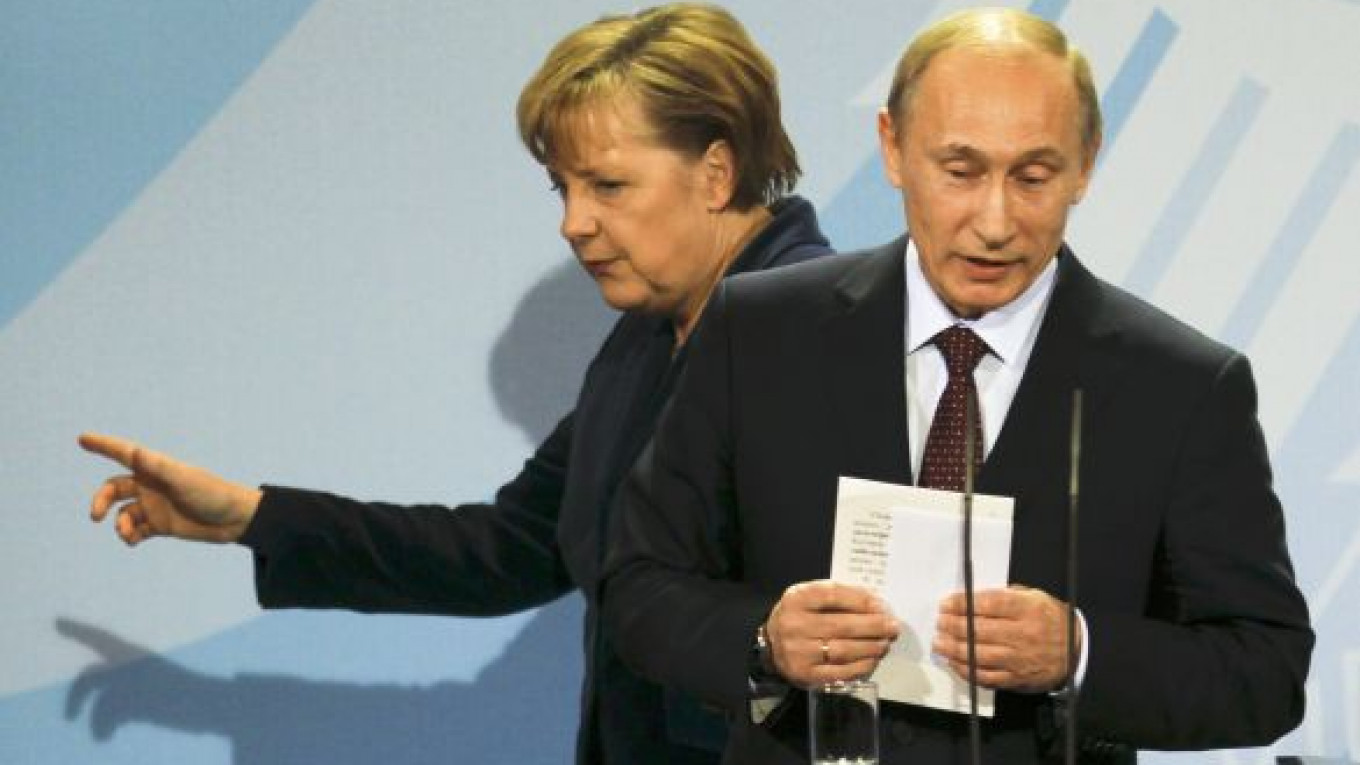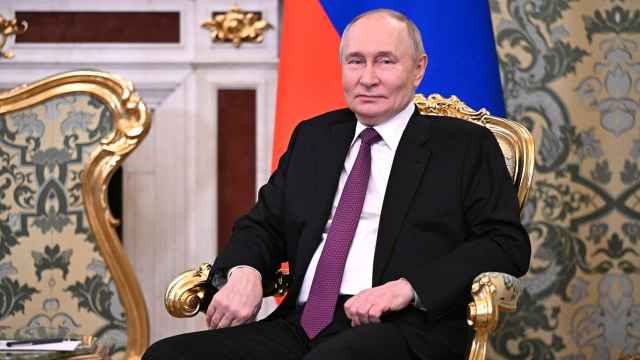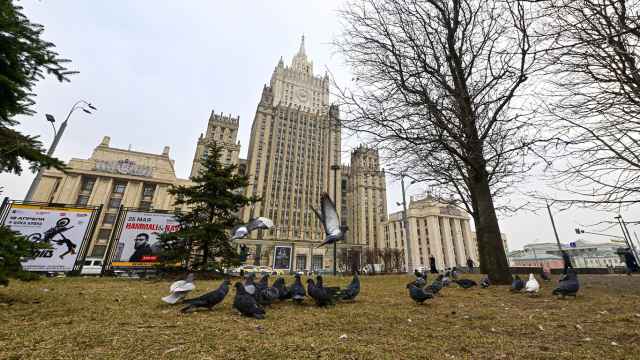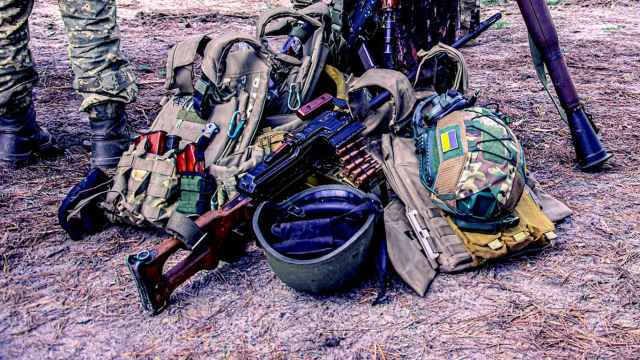Prime Minister Vladimir Putin likened ill-considered economic policy to terrorism and religious intolerance on Friday, telling a business forum in Berlin that Russian companies seeking to invest in Europe were facing a number of political and economic barriers.
Russian investors have to overcome unfair hurdles in Europe and often find that “the door is just shut,” Putin told chief executives of Germany's largest companies.
But the main thorn in the prime minister’s side was the Third Energy Package legislation, which goes into effect in March and is intended to ensure that small gas suppliers can get unhindered access to European infrastructure and compete on an equal footing with the dominant players.
"What is this? What is this robbery?" Putin said, referring to plans by the Lithuanian government to separate the gas supply and transport business at the national gas company Lietuvos Dujos, which is partially owned by Gazprom.
Putin quipped that if Europeans did not want gas or nuclear energy, they would still have to rely on Russia for firewood to heat their houses.
"I don't understand at all. How will you heat [your houses]? You do not want gas, you are not developing nuclear energy. Will you get your heat from firewood?" Putin said. "But even for firewood you will need to go to Siberia, do you understand? You do not even have firewood."
Smoother Investments
The prime minister said he wanted to change the trend of Russian companies facing problems with their foreign investments, adding that the situation negatively affects European business as well.
He cited the rejected bid by a consortium of Sberbank and GAZ Group with Canada's Magna International to buy General Motors' German unit Opel in 2009, saying the carmaker was no better off “after the deal failed.”
He also said the Hungarian government was “doing it's best” to illegally isolate Surgutneftegaz from management issues at the MOL refinery, where the Russian oil company holds a 20 percent stake.
Putin also brought up an investigation into billionaire Viktor Vekselberg's Renova Group, which owns technology assets in Switzerland. Vekselberg and his associates were accused of not declaring the details of their actions when they acquired Oerlikon group.
“It was dragged from court to court. It seems [the problem] is resolved now, thank God. But it's impossible to work this way!” he said.
Swiss newspaper Der Sonntag reported Sunday that the Swiss finance ministry was ordered to pay 194,150 Swiss francs ($193,454) to Vekselberg and his associates as compensation, in light of the not-guilty verdict.
Reputation Is Everything
Russian companies are treated with mistrust in Europe partly due to stereotypes of the past accompanying the country's image and partly because of the negative experience of partnering with them, said Sergei Nikitin, head of the representative office of the Russian Chamber of Commerce and Industry in Germany.
“This will be resolved over time,” he said by telephone from Berlin, adding that Russian firms should work on improving their image.
The business image of Russia doesn't correspond to international standards, said Alexander Rahr, a Russia expert at the German Council for Foreign Relations.
“They don't look like European or even U.S. companies, that's why it's very difficult to talk to them,” he told The Moscow Times.
Rahr said there are very few representative offices of Russian firms in Europe, so “Western society has no chance to get to know of their transparency.”
“The stereotype of Russian companies is that they are directed by the Kremlin. That's the image of state monopolies, which lobby interests of politicians, not businessmen,” Rahr said, adding that the companies themselves do very little to improve this.
He also said Putin often has to act as chief negotiator, since many of his business leaders don’t know how to conduct negotiations.
Rahr said, however, that European firms seeking to come to Russia also face obstacles, with corruption being one of the main barriers hindering business ties with Europe and preventing mid-sized companies from getting into the Russian market.
Rahr said Putin's speech was very well received by German businessmen and politicians, who liked his manner of speaking in front of the audience.
“He didn't read from paper … he was informed about all details. This makes a good impression,” Rahr said.
Putin’s Article
In his speech, Putin responded to Chancellor Angela Merkel's criticism of his article published in Sueddeutsche Zeitung on Thursday, in which the prime minister pushed the idea of creating a free-trade zone with Europe.
Merkel said Thursday that she was skeptical about Putin's proposals, which contradicted the Kremlin's actions, especially in light of the Russian customs union with Belarus and Kazakhstan.
Putin called Merkel's remarks “positive signals,” and said he was glad that she had read his article.
“This is good already,” he said. “That means she's interested in what's going on in Russia.”
Chief executive of Deutsche Bank Josef Ackermann, who participated in the forum, said Russia and Europe should focus on cooperation and stop arguing “about minor things.”
Putin's plans to create a common free-trade zone “have to be supported in a very open minded manner and with enthusiasm,” Ackermann said, The Associated Press reported.
Speaking at the forum, Putin reiterated some of the ideas presented in his article.
“I don't know which forms our cooperation should take … whether it will be a common free market or our associated membership in the European Union, but Russia's and Europe's rapprochement is inevitable if we want to be preserved as a civilization and want to be successful and competitive,” Putin said.
He didn't rule out that Russia and Europe might create a common currency zone. He didn't specify whether it would be a ruble or a euro zone.
He also said the European Union should work more closely with Russia when formulating energy policy.
“I think … it's reasonable that new fair rules in such a sensitive area be developed by our colleagues in the European Union and the European Commission at least in consultation with Russia, as a big supplier of resources,” he said. “Otherwise we'll permanently face absurd situations or conflicts coming from nowhere.”
During the question-and-answer session of the business forum, Putin said he and President Dmitry Medvedev would jointly decide on who would run for the presidential elections in 2012.
“We'll look at the condition of the social sphere, economy, political situation, and we will make an agreed decision in the interest of the country,” he said.
Putin also said trade between Russia and Germany was unlikely to reach the pre-crisis level of $52.6 billion in the nearest future, although there were some positive changes.
Mutual trade increased by 34.3 percent in January through September to $36 billion, he said at a separate meeting with German businessmen, and is “perfectly balanced, with each country selling $18 billion of goods.”
The prime minister stopped at a kiosk and shopped for Christmas souvenirs after leaving the forum.
A Message from The Moscow Times:
Dear readers,
We are facing unprecedented challenges. Russia's Prosecutor General's Office has designated The Moscow Times as an "undesirable" organization, criminalizing our work and putting our staff at risk of prosecution. This follows our earlier unjust labeling as a "foreign agent."
These actions are direct attempts to silence independent journalism in Russia. The authorities claim our work "discredits the decisions of the Russian leadership." We see things differently: we strive to provide accurate, unbiased reporting on Russia.
We, the journalists of The Moscow Times, refuse to be silenced. But to continue our work, we need your help.
Your support, no matter how small, makes a world of difference. If you can, please support us monthly starting from just $2. It's quick to set up, and every contribution makes a significant impact.
By supporting The Moscow Times, you're defending open, independent journalism in the face of repression. Thank you for standing with us.
Remind me later.






